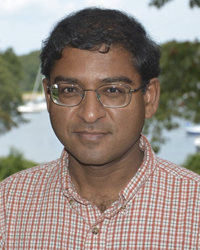Prabal Dutta Selected for Sloan Research Fellowship
Dutta’s research has pioneered practical, low-power platforms and wireless protocols for pervasive sensing, computing, and communications.

 Enlarge
Enlarge
Assistant Professor Prabal Dutta has been selected for a Sloan Research Fellowship by the Alfred P. Sloan Foundation for his work in developing energy-scavenging sensors and wireless communications, mobile-sensor-interfaces, and “Smart Dust” system architecture.
Prof. Dutta’s research has pioneered practical, low-power platforms and wireless protocols for pervasive sensing, computing, and communications, typically by leveraging hardware/software insights and applying a whole-system approach that spans circuits to software. His work aims to give us the platforms and protocols to realize these systems at scale and in the service of society, and in the interests of increasing the diversity and longevity of life on our planet.
In 2009, Prof. Dutta created Hijack, a hardware/software platform for interfacing a variety of sensors to smartphones. The design was open-sourced and has been adopted by researchers and commercial companies to develop solutions from mapping the radiation field near Fukushima to assisting with smoking cessation.
Prof. Dutta has developed novel methods of using sensor networks to perform metering of energy, water, and gas usage in buildings, and is pursuing development of a class of low cost, networked, energy scavenging “peel and stick” sensors that can be affixed to everyday objects to infer their contributions to whole-building resource consumption. The sensors monitor the ambient conditions around a load and, using statistical methods, correlate those conditions with readings from existing electricity, gas, or water meters, providing individual estimates without intrusive metering.
Prof. Dutta’s research in the area of sensor networks has taken a number of approaches to improve the energy efficiency of wireless sensor platforms and protocols, which has allowed him to develop cubic-mm scale, ~10nW sensor nodes, called Michigan Micro Motes, that can operate perpetually from energy harvested from the indoor environment.
Prof. Dutta is working with Prof. David Blaauw, a colleague in ECE, to pursue the development of an open-source interconnect architecture for “Smart Dust,” which they call MBus. The technology allows nano-power, millimeter-scale chips designed by different researchers to interoperate, helping to accelerate progress toward realizing the Internet of Things.
Prof. Dutta received his PhD in Computer Science in 2009 from the University of California, Berkeley and joined the faculty at Michigan in 2010. He was selected for an NSF CAREER award in 2014 and named to Popular Science’s “Brilliant 10” list the same year. He is a recipient of the Intel Early Career Faculty Honor Program Award. He is affiliated with the Advanced Computer Architecture Laboratory.
About the Sloan Research Fellowship
The Sloan Research Fellowships seek to stimulate fundamental research by early-career scientists and scholars of outstanding promise. These two-year fellowships are awarded yearly to 126 researchers in recognition of distinguished performance and a unique potential to make substantial contributions to their field.
 MENU
MENU 
